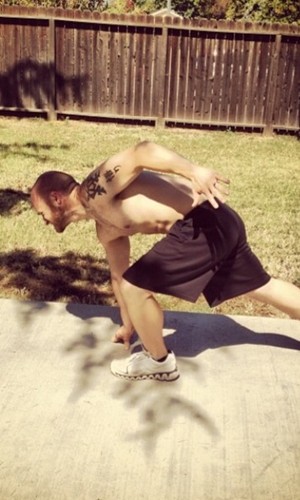Leigh-Chantelle
VLV Articles
Victor Rivera moved to Los Angeles, CA in 2003 from Massachusetts, beginning his path to finding himself - and in the process, taking on the vegan lifestyle. Victor is a National Academy of Sports Medicine (NASM) certified personal trainer, as well as a student at UCLA where he is studying psychology. In his downtime, Victor eats lots of tasty vegan food with his wife and son, writes on his blog, as well as taking care of their dogs and visiting shelters and animal sanctuaries.

Why Vegan?
How and why did you decide to become a vegan?
My vegan journey began when I was reading “Fast Food Nation” and my wife, a long-time vegetarian, was reading “Skinny Bitch.” After I finished reading both books, which explained the inhumane levels of animal cruelty, as well as many of the health, environmental and social issues that come from the meat and dairy industries, we both decided to go vegan.
How long have you been vegan?
Over seven years and counting!
What has benefited you the most from being a vegan?
The biggest benefit I have received from going vegan is knowing that I am not contributing to the mistreatment of our fellow earthlings, as well as minimizing my carbon footprint. On the dietary level, the benefit for me has been better health - as I was able to lose about 60 pounds and essentially get rid of my Irritable bowel syndrome (IBS) after going vegan.
What does veganism mean to you?
To me, veganism means awareness. Most of us were just given a plate full of meat without ever considering where it came from and how it ended up on our tables. So taking the time to understand the impact that our diets have on the animals, the planet, and our bodies is what being vegan is all about.
Training
What sort of training do you do?
I tend to do full-body, functional training (as opposed to, for instance, body-building) with weights, kettle-bells, TRX, and body-weight. I also do what some call “Intuitive Training,” meaning if my body isn’t up for powering through a weight session, I’ll go for a nice bike ride, jog, or a little bit of yoga/stretching. Listening to my body comes first before a predetermined workout.
How often do you (need to) train?
I try my best to train with weights at least five times a week and do some light cardio the other two days. Your frequency of training depends on what your goals are, though. If you are just trying to be generally healthy, four days a week for half an hour at moderate intensity is good. If you’re going for more advanced goals, training five to six days a week at a higher intensity is the way to go.
Do you offer your fitness or training services to others?
I am a personal trainer, certified through NASM. I’ve been training clients since 2009 and love it. I’m also studying psychology at UCLA, so I understand and help others with the mindset portion of diet and exercise.
What sports do you play?
I really enjoy playing baseball, basketball and football mostly. Basketball seems the easiest to play these days as I just need to grab my ball, head outside to my hoop and shoot around.
Strengths, Weaknesses & Outside Influence:
What are you strengths as a vegan athlete?
My strength as a vegan athlete is weight-training endurance. I seem to be able to keep going at the weights in terms of strength and form while those around me need breaks or look super wobbly. My tip here is to focus on your breathing, as opposed to those thoughts that question why you’re working so hard.
My biggest psychological strength is my ability to commit to something. If I’m going to do it, I’m going to go all the way. When I went vegan, it wasn’t just some thing I was going flirt around with. I bought as many books as possible, visited all of the websites, and researched everything about it. When I decided to go back to school, I just put my head down, hit the books, and studied like crazy even on those many days where I just wanted to give up and watch TV.
What do you think is the biggest misconception about vegans and how do you address this?
Of course, the biggest misconception about vegans is that we can’t contain muscle mass, we don’t get enough protein and no way can we be athletes of any kind. I address this by basically saying, “Do I look like I don’t get enough protein?” From there, I explain to those willing to listen how I get all of my amino acids, as well as all of the other nutrients people assume we are missing (B-12, Omegas, Calcium, etc.) I try to calmly educate those who question the capabilities as best as possible, while silently just wanting to bench press them.
What is your biggest challenge?
My biggest challenge physically is long-distance running. Between my stocky build, and how bored I get while jogging, I have always struggled with that type of training. I prefer to ride my bike or use the elliptical at the gym when I’m looking for some basic cardio.
I would say the biggest challenge I am working on personally is finding balance in my life. It’s been hard for me to divide my time between my family, my schoolwork, my own training and my training business. I seem to be figuring it out, though, but still need some work. Wish me luck.
Are the non-vegans in your industry supportive or not?
The non-vegans in my industry seem be generally supportive. My fellow trainers know that at the end of the day, it’s about facts and results. When they hear what I have to say and see me in action - as well as see the transformation that my clients go through - they’re cool with it and actually usually like to learn more, as trainers tend to seek more information from each other.
Are your family and friends supportive of your vegan lifestyle?
My friends and family are very supportive of my vegan lifestyle, especially once they’ve eaten one of my wife’s amazing meals. It’s hard to deny how yummy vegan food is. I’m also fortunate to live in the Southern California area, where people seem to be more accepting of vegans. When I tell people in my old hometown in Massachusetts that I’m vegan, they usually say something like, “So you don’t eat red meat?”
What is the most common question/comment that people ask/say when they find out that you are a vegan and how do you respond?
“Where do you get your protein?” Then I tell them that basically everything has protein in it, though some sources have more than others. I also explain that protein isn’t some magical nutrient that you need in exorbitant amounts in order to be healthy. Protein is so overhyped now it’s outrageous. Then, if they’re really interested, I like to explain that the protein in meat isn’t even efficiently absorbed, and the cost/benefit of meat as a source of nutrients is so risky. If I’m tired, I just flex, and ask them, “Do you think I’m not getting enough protein?”
Who or what motivates you?
My wife and son motivate me the most. There are plenty of days where I want to turn in a mediocre “performance,” but when you have other people who depend on you, taking a day off is not an option. So being mentally present and driven benefits me personally, but also sets a good example for my son. In the vegan community, I keep up with Eco-Vegan Gal, Robert Cheeke, Samantha Shorkey, and a host of others to keep me on the vegan and weight-lifting path.
Food & Supplements
What do you eat for:
Breakfast - Oatmeal and fruit, or Nature’s Path cereal with some soymilk.
Lunch - A healthy burrito: brown rice, beans, avocados, tomatoes, onions, and lettuce in a whole-wheat wrap.
Dinner - On a healthy day, I just love some basic brown rice noodles, tempeh or tofu with broccoli and carrots. When I want to treat myself, I LOVE vegan pizza!
Snacks (healthy & not-so healthy) - My favorite healthy snack are bananas. They’re so satisfying as well as energy packed. My not-so healthy favorite snack is a Clif Bar.
What is your favourite source of:
Protein - Beans are my favorite healthy source of protein and Tofurky sausages on a junk food type of day.
Calcium - Soymilk and tofu, as well as kale in my green drinks.
Iron - Beans and lentils.
What foods give you the most energy?
Dense fruits like bananas and strawberries give me tons of energy, as well as peanut butter. Whenever I have a spoonful of peanut butter, I just feel so physically and mentally satisfied.
Do you take any supplements?
I like Vega’s supplements and protein powders, as well as Orgain and Garden of Life protein powder when I’m on a budget. I take B-12, Omega and a multi-vitamin pill, but try to get as much of my needs from whole foods as possible.
Advice
What is your top tip for:
Gaining muscle
The best way to gain muscle is by adding more calories to your diet. To “Get Bigger,” you’re going to have to “Eat Bigger.” The extra calories should be healthy though! And well distributed throughout the day (6-7 meals).
The training side of gaining muscle is to try to get as strong as possible, as well as increase your volume. This means 3-4 weeks of 4-6 reps, 3-4 weeks of 8-10 reps, and three weeks of 12-15 reps. Just think, more weight, more volume, more food.
Losing weight
The best and safest way to lose weight is to really watch what you’re eating, count your calories, and train for longer periods of time so that you’re burning more calories. In order to watch what you’re eating and calculate a weight loss goal (in a reasonable amount of time), I recommend the MyFitnessPal App. This way you are keeping track of what you eat, as well as eating a healthy amount of calories. Don’t do extreme dieting (less then 1000 calories a day) as this typically just leads to gaining all of the weight back plus more.
As for the training side, try to increase the length of your training sessions. If you generally lift weights and do some cardio/interval training for 45 minutes or less, try to increase your time at the gym (or wherever) to an hour. Do circuit-style cardio strength training and supersets when lifting weights so that you’re not taking breaks and constantly burning calories. And try to be active during your general day by taking the stairs instead of the elevator, park far away at the mall, go for a short walk while you’re making a phone call, etc. Your thought here is to have an active lifestyle.
Maintaining weight
The best way to maintain your weight is a combination of the suggestions above. This means you are mixing up your weight training style so that your body is always being challenged via strength or endurance, and you are watching what you are eating either through the MyFitnessPal app, your own food log, or just mentally monitoring your food. If you’re gaining weight, you’re eating too much and/or the wrong types of food. If you’re losing weight, you’re probably not eating enough.
Improving metabolism
To improve metabolism, make sure you are eating smaller meals 5-6 times a day. Eating too large of a meal, as well as waiting too long between meals, slows your metabolism down.
To improve your metabolism through training, weights are the best, as well as interval training (sprints on a bike or elliptical for 30 seconds, followed by 30 seconds of a regular pace), and Tabata for a higher intensity training that will really boost your metabolism. While steady state cardio (i.e. a 30 minute jog) has its purposes, it doesn’t tax your system in a way that speeds up your metabolic rate enough to get into fat-burning mode.
Toning up
The best way to “tone up” is to do more of my style of training, which is a full-body, functional regimen, training each body part four times a week at least (every other day). This will keep your body more lean and athletic, as opposed to body-building, which focuses on “Chest and Tricep” day, “Leg Day,” “Back and Biceps,” etc., once a week (or twice) per muscle group.
A functional style session looks like three sets of squat jumps, three sets of lunges, three sets of bench press, three sets of dumbbell shoulder press, and three sets of one minute of planks, completing a “Push Day.” The next day would be Kettlebell swings, Back Extensions, dumbbell row, pull ups, and medicine ball twists, completing a pull day. This way you are targeting all of your major muscle groups, but not overtraining them, so that you can train more frequently and get more of a toned look. “Men’s Health Power Training” is a good place to start planning this type of routine.
How do you promote veganism in your daily life?
I promote veganism daily by putting posts up on my blog, or Facebook, Instagram and Twitter accounts. I wear “Vegan Bodybuilding” type shirts to the gym frequently, and answer questions whenever anyone reads my shirt and wants to know how it’s possible. I sign petitions all of the time (i.e. Sea World Must Go Away), and tell people the truth when they say things like, “but I eat cage-free chicken…” I’m also involved in groups and just joined “Bruins for Animals” at UCLA.
How would you suggest people get involved with what you do?
I think the main way to get involved is to talk the talk, and walk the walk. Make yourself as a informed as possible so that you are up to date on which companies are still cruelty-free or vegan-owned; keep up with the latest health findings regarding animal products, meat recalls, the environment, etc., so that when non-vegans ask you questions, you are prepared.
Also, do whatever you’re comfortable with. At first, I just wanted to stop eating meat, but wasn’t quite asserting my beliefs out in the world. Once I became more confident and informed, I found my “vegan voice” and was able to comfortably post my findings on my sites, wear my vegan shirts in public with pride, and be as involved and part of the movement as possible.
Stay tuned for upcoming interviews with other Vegan Athletes, Fitness Fanatics and Exercise Enthusiasts by Subscribing via RSS.
The Book is Coming Soon!
Leigh-Chantelle is an International Speaker & Consultant; Author, Singer/Songwriter and Blogger.
Latest Photos
© Leigh-Chantelle Site by
DesignVoodoo.com|hosted green| mobile compatible|Google Translation
mobile compatible|Google Translation
 This work is licenced under a Creative Commons Attribution-NonCommercial-NoDerivs 3.0 Australia Licence
This work is licenced under a Creative Commons Attribution-NonCommercial-NoDerivs 3.0 Australia Licence
 This work is licenced under a Creative Commons Attribution-NonCommercial-NoDerivs 3.0 Australia Licence
This work is licenced under a Creative Commons Attribution-NonCommercial-NoDerivs 3.0 Australia Licence
